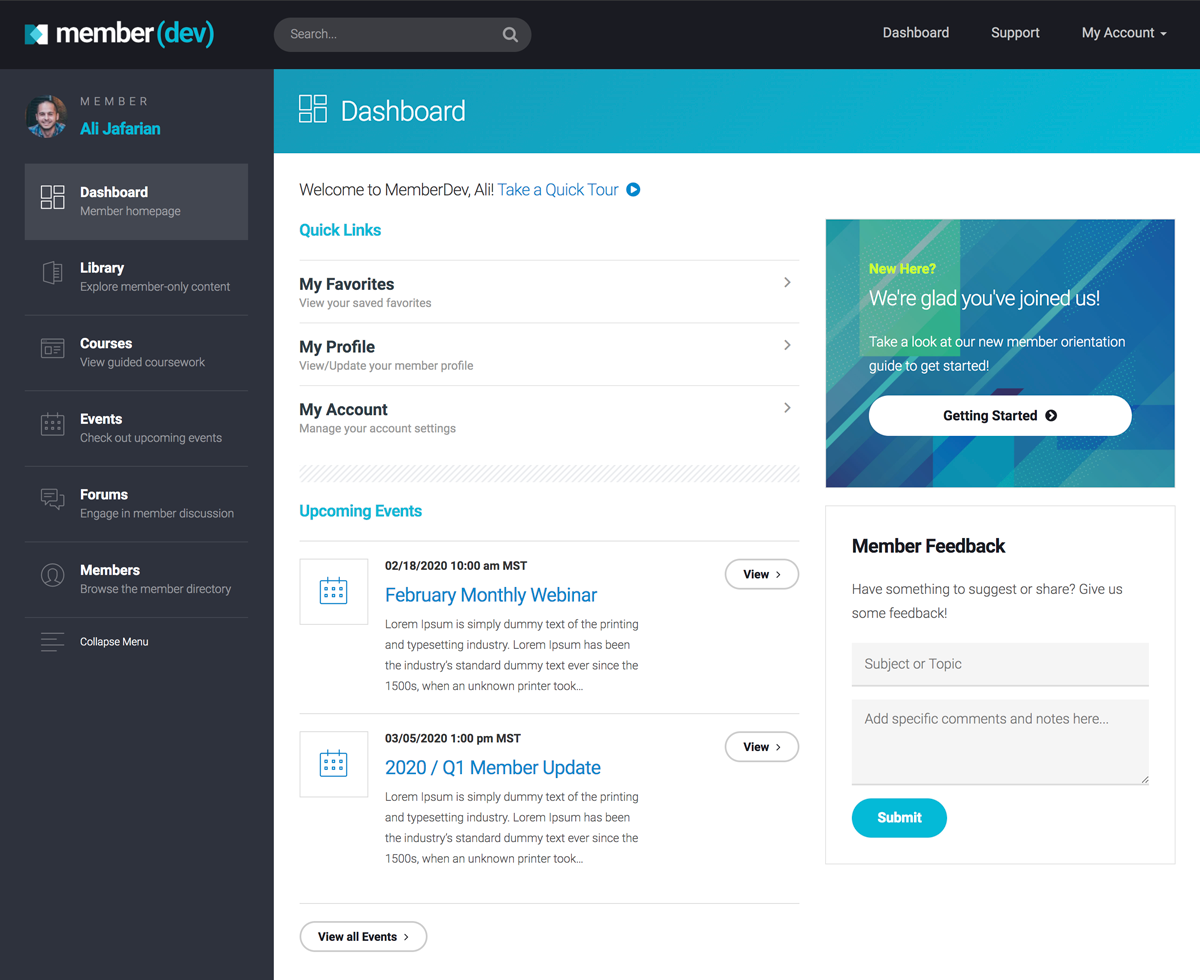Creating an online community can be a smart move to help you connect with like-minded people and others interested in your line of business. When establishing an online community, two options are creating a private website forum or creating a Facebook group.
Below is a list of pros and cons to help you decide which is a better fit for your needs.
Pros
First let’s discuss a few benefits for each.
Facebook Group Pros
1. Facebook has an enormous reach
Facebook is the most used social platform, with nearly 2.45 billion monthly active users. So creating your online community on the platform where people are already spending time could make sense.
However, while Facebook has a large user base, this does not mean your current or potential members are active Facebook users! That’s why having a marketing strategy and understanding your audience is crucial.
To create an effective membership marketing strategy, start by gathering information about your existing members, then find trends on their shared demographics, interests, and habits.
2. Getting started is easy
If you already use Facebook, there is little work involved in creating a group. You’ll only need to answer a few prompts and make a name for the group.
Facebook Groups come in three varieties: Public, Closed, and Secret. The difference between the three options comes down to who can see what. Public groups allow anyone to join, while closed and secret groups are more restrictive.
3. Acquiring new members is relatively easy
With a simple click, you can invite your Facebook friends or others in your network to join. Also, your members can easily refer their Facebook friends to join the group as well.
There is also the potential for Facebook users to discover your group organically. When users search on a topic related to your group or group name, your group may show up in the search results.
Now let’s discuss a few of the pros for a private website forum.
Website Forums Pros
1. You own your user data
Running forums on your own website provides full access to your user data, as opposed to letting Facebook own that data. Managing user data certainly comes with responsibility but it also opens up a lot more opportunity for future features and engagement.
2. Forums are more orderly
Forums can be arranged around various topics and questions, which is incredible. Creating your forum allows you to reach audiences who’ve come because they truly care about the topic and are interested in widening their horizons.
Because you can organize forums, your audience can easily access exactly what they want out of the forum, which allows these types of platforms to be beneficial in a way Facebook groups are not.
3. You can monetize forums
If your forum performs well, you can earn money off the forum alone by selling ad space or providing sections of the forum exclusive for a fee.
This allows the effort and time you’ve put into building and operating a forum to go beyond being an avenue to market to be a way to generate profit.
4. Forums generate more traffic to your website (SEO)
If you choose to create a website forum, it can be found in an internet search engine like Google. SEO tactics can also be applied to your forum and increase traffic just like any other web page.
To learn about SEO, check out our SEO 101: An Introduction and Strategy Guide.
If members visit a forum housed on your brand’s website, it drives overall traffic to your website. And getting more people to visit your site is helps to convert more business.
Now let’s discuss the cons for each.
Cons
Facebook Group Cons
1. Facebook owns your user data
This is the biggest con by a long shot. If you run a Facebook group you are giving them complete ownership of all your user data and interactions that take place in that group. This does not lend well to future growth strategies.
2. Facebook groups aren’t well organized
Within a Facebook group, it is not easy to find what you are looking for. In the main feed, posts aren’t grouped by topic. Instead, the Facebook algorithm shows posts based on which ones have had the most engagement.
To find a particular thread or topic, users must use the search box to look for posts with specific keywords. So if a user is not familiar with your brand’s jargon or industry terminology, they might know the relevant search terms to use in the search box and won’t find the information they need in the group.
3. You can’t monetize a Facebook group
If you create a public Facebook group, you can’t purchase ads, get sponsors, or charge people to join the group the way you can on a website forum.
4. You don’t have total control over your group
Facebook has the authority to change how groups run and operate at any time they chose. Depending on your brand’s or online community’s content, the changes could be detrimental to your group.
Website Forums Cons
1. Inferior UX
Most website forum software does not provide the same type of user experience (UX) that Facebook offers. Their vast resources allow them to put out a product that is hard to match. That said, you can find some attractive options or invest in custom web development to provide a similar UX.
2. Engagement takes work
Getting members to stay, participate, and continue to be engaged can be challenging for private online communities. So you’ll need to put some effort towards promoting your forum.
But don’t fret because membership businesses have a built-in audience primed for digital connection. So if you are considering a forum, check out this guide that covers the basics of building a thriving online community.
Which makes sense for you?
If your audience is already on Facebook and you have no monetization plans, you should probably stick with Facebook. It will give you instant engagement tools without much extra work. The main thing you sacrifice is data ownership and control, which is becoming more and more valuable.
On the contrary, private forums are better for communities that aren’t heavy Facebook advocates. Also, if you have monetization plans, a private forum is a better option. Private forums are common for many online membership communities. They take more work to create, but the upside is worth it if you’re selling the value of a dedicated private community.




